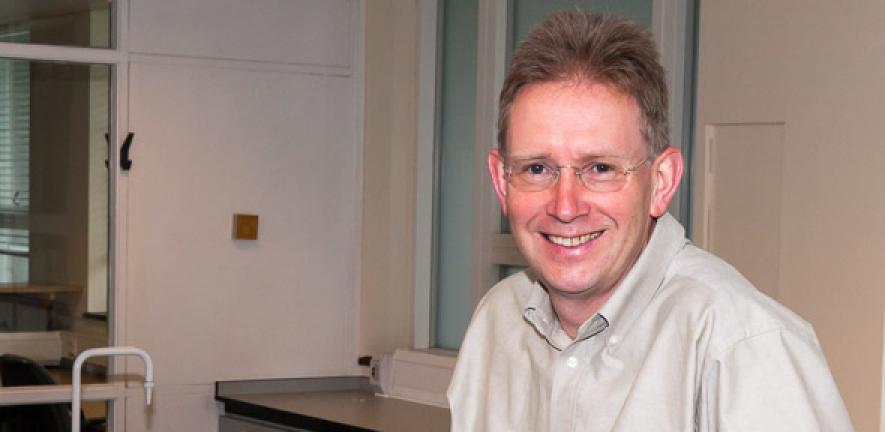
Chris says he was thrilled to be awarded this prize, which recognises work at the interface between chemistry and other disciplines. “I have not paid much attention to recognition or winning prizes, so it was quite surprising to me how very pleased I was to be told I had won this award. Some of the pleasure is personal -- I was informed during the Covid-19 lockdown, when most news was unrelentingly depressing,” he says
Chris has been particularly inspired by his research team and their achievements. “I have been tremendously motivated by working with my research group, and have had the real privilege of being well funded with the intellectual freedom to follow my interests. More of the pleasure came from the recognition the award brings for the achievements of my research group past and present, and our very interdisciplinary approach to science,” he says.
Reflecting that the award is for interdisciplinary science, Chris points out the importance of interdisciplinary research and collaboration, which has become especially relevant during the Covid-19 crisis. “At present I am working as part of a team with scientists from AZ and GSK to set up a high throughput Covid testing centre in the university. This is an astonishing project, bringing together chemists, biologists, and virologists, with experts in automation and IT. What we are achieving is exciting and important - and would be impossible without teamwork and trust.”
Chris is the Professor of Biological Chemistry here in the Department and the Pro-Vice-Chancellor for Research in the University. His interest in research is “about taking simple ideas or concepts and developing them.” This is illustrated by the two main themes of his research: using fragment-based approaches to design molecules, and developing microdroplets as a platform technology.
“Using fragment-based approaches we identify a small molecule [a fragment] that binds to a protein, and use X-ray crystallography to see how it is binding. We then grow or elaborate that fragment using chemistry into progressively bigger molecules that binds more and more tightly to the protein. These molecules can be good starting points for the development of therapeutics,” he explains.
In 1999, Chris co-founded Astex with Harren Jhoti and Sir Tom Blundell, which became the world-leading company in fragment-based drug discovery. Astex was acquired by Otsuka in 2013. Astex has already played a key role in the discovery of two anti-cancer drugs: Kisqali [2017] and Balversa [2019]. “There have been many highlights in my career,” he says, “but Astex getting a drug to market has to be one of them.”
In the late 1990s Chris became interested in nanotechnology and scanning probe microscopy. This eventually led to pioneering work on microdroplets as a novel experimental platform, and resulted in him co-founding Sphere Fluidics in 2010 and Aqdot in 2013.
“In our microdroplet research we take very, very small water droplets and use them as miniature reactors for doing chemical or biochemical reactions. This enables many millions of reactions to be studies in a very short space of time. We have applied these ideas to very diverse areas of study including developing new materials, sequencing single cells, and studying how algae grow,” he says.
Chris was an undergraduate and graduate here, completing his PhD on polyketide biosynthesis with Jim Staunton. He then spent a postdoctoral year in the USA with Professor David Cane studying terpene enzymology, before returning to Cambridge. He says that much of his inspiration came from colleagues who influenced his early thinking about research, naming his PhD Supervisor Jim Staunton, David Cane, Sir Alan Battersby, Jeremy Sanders and Jeremy Knowles as particular mentors.
Chris has published over 330 papers and is an inventor on numerous patents. He was a founding director of Cambridge Enterprise. From 2013-2015 he was the first Director of Postdoctoral Affairs in the University. He was elected into the Academy of Medical Sciences in 2012 and a Fellow of the Royal Society in 2016.
Up to three Interdisciplinary Prizes are awarded each year. The other 2020 prizewinners are Professor Iain McCulloch (Imperial College London and King Abdullah University of Science and Technology) and Professor Emma Raven (University of Bristol).

